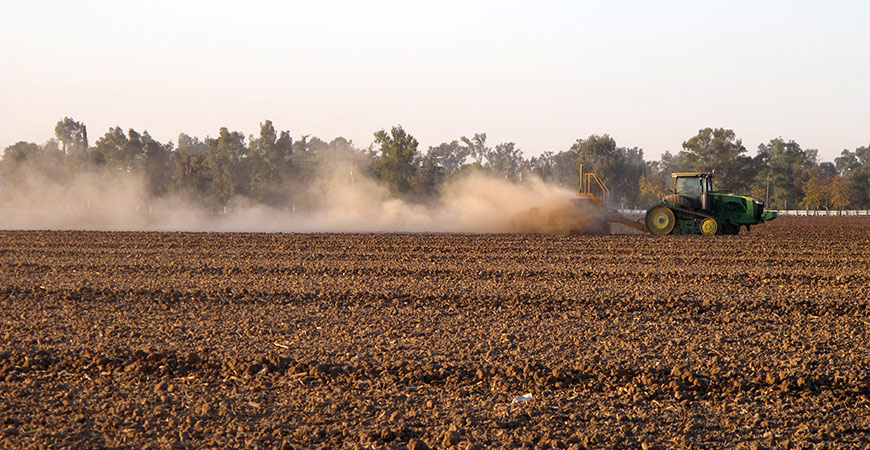
California’s Central Valley is on the front lines of climate change. The Fourth Regional Climate Change Assessment, by a team of UC Merced and affiliated researchers, illustrates the biggest problems — and possible solutions — facing California’s unique biomes and communities, from the coasts to the mountains and deserts.
“The San Joaquin is uniquely at the heart of California and this first-of-its-kind regional assessment of climate change impacts shows the unique challenges faced by the region, including access to safe drinking water and dependence on vulnerable water supply for agricultural production,” said report co-author and Associate Dean for Research Professor Joshua Viers. “It also demonstrates the capacity of UC Merced researchers to shed new light on these issues and propose meaningful solutions for our region to better prepare for extreme climate events and build more resilient communities.”
The latest San Joaquin Valley regional assessment was published online on Jan. 6 by the California Energy Commission and California Natural Resources Agency.
The report points to familiar Valley experiences: extreme heat, prolonged multi-year drought, with 20% less overall rainfall than normal during the growing season, poor air quality from fire and particulates, and stress or collapse of critical infrastructures such as canals, roads and bridges.
The report also speaks to the capacity to adapt current practices and resources to manage climate change. Some promising mitigation and adaptation strategies include improving flood management to serve ecosystems and replenishing groundwater aquifers when water is available. The wide adoption of carbon-neutral technologies and electrification of vehicles will contribute to better air quality, say the authors.
The key solution from the UC Merced authors is focusing on at-risk communities and the capacity to change the situation for multiple benefits.
The report builds on UC Merced’s expertise in sustainability, water resources, wildfire, and climate change. Solicited by the state and coordinated by lead author and UC Merced alum and postdoctoral researcher Angel Santiago Fernandez-Bou, the report includes faculty experts in wildfire, water and climate change — professors Viers, LeRoy Westerling and Josué Medellín-Azuara. These faculty members advised and conducted a graduate class to start the development of the report. Other authors include researchers from the Union of Concerned Scientists, Fresno State and Saint Louis University.
The report will be used by the state of California, nonprofit organizations and the general public to gather the most up-to-date science and information on climate change at the regional level.
“Emergency management and health services require proper investments and adequate planning in underserved frontline communities. The San Joaquin Valley report highlights what investments will help us all adapt to climate change,” Fernandez-Bou said. “The agricultural identity of the Valley can become an important asset for mitigation and adaptation strategies, and to promote environmental and socioeconomic justice — if some regenerative-agriculture practices are incentivized with adequate policies.”
The team identified major climate-linked negative impacts for communities, agriculture, ecosystems and infrastructure that will affect most aspects of life in the San Joaquin Valley.
The key findings of the report illustrate the complex nature of climate change impacts on a water-limited area.
Increasing temperatures have a drying effect by evaporating more water, and warmer weather also means many storms will be warmer and wetter and more concentrated in fewer months during the winter. Valley water resources will swing between flooding events and prolonged droughts with increased groundwater pumping.
Dry soils, forests and communities will fuel the severity and extent of wildfires, as well as lengthening fire season, impacting air quality for many months.
Climate change does not affect all Californians equally. Those without sufficient resources — economic, infrastructure and frontline communities in general — will be disproportionally hit. Air quality and human health impacts due to climate change are more pronounced in rural disadvantaged communities of the San Joaquin Valley than in the rest of California. These populations are more likely to experience more heat-related deaths and illnesses, deteriorating air and water quality, and general lower quality of life and decreased potential for livelihoods. Some intensive agricultural practices and unplanned development on the San Joaquin Valley may also exacerbate negative impacts of climate change, furthering habitat loss for native species and the establishment of invasive species.
“Some of the most economically valuable commodities are threatened by some early climate change effects,” the Climate Change Assessment says. Fewer winter chill hours will affect many of the productive orchards throughout the Valley and foothills, and all agricultural production will be affected by water availability, increased evaporative demands and extreme heat. Reduced crop yields and changes in timing of cropping systems may affect the regional economy and employment.
“Multi-benefit and inclusive approaches to strategically repurpose land in the San Joaquin Valley and increasing climate resilience are worth pursuing to ensure a habitable and thriving area,” Medellín-Azuara said. “But agriculture, communities and ecosystems in the San Joaquin Valley can coexist sustainably if the state’s plans are comprehensive and include mitigation and adaptation.”



